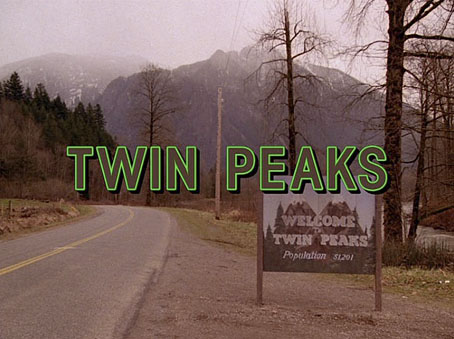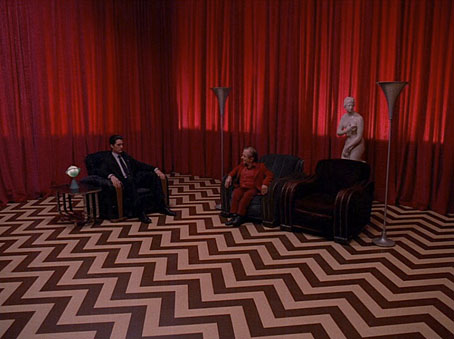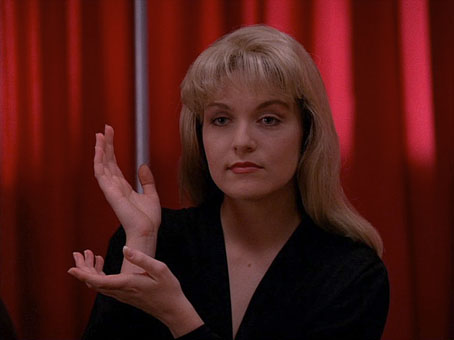
Having spent the past two weeks re-watching the whole run of Twin Peaks, and following that with David Lynch’s 1992 prequel, Fire Walk With Me, I feel I owe the producers of these works a note of apology. Being a long-time Lynchophile I eagerly watched every episode of Twin Peaks when it was first screened by the BBC in 1991, and while I thoroughly enjoyed the first fifteen episodes I grew increasingly dismayed with the series as the principal writer and director wandered off halfway through and the whole thing lost focus. There was a return to form with the very last episode, and Fire Walk With Me is great despite some flaws, a film I much prefer to the later Lost Highway, but that disappointment meant I’d never tried watching the whole series again until now, courtesy of a very reasonably-priced Gold Box Edition (thanks, Fopp).

Kyle MacLachlan and Michael J. Anderson.
There were a number of surprises: first of all the main story hangs together better than I remembered, starting with the investigation into Laura Palmer’s death, grading to the cat-and-mouse game with rogue FBI agent Windom Earle, then looping back via the Black Lodge business in the final episode and Fire Walk With Me to Laura Palmer again. The sub-plots in season two are still a mix of the annoying (all the Dick Tremayne stuff) or the pointless (the unconvincing attempt to put James Hurley into a Black Widow ménage)—and the episode directed by Diane Keaton is positively amateurish—but if you stick with Agent Cooper all is well. Aside from the content lapses the quality of the whole thing was a delight, having watched the series originally with mono sound on a TV with a fuzzy picture. There are many great performances which benefit from the DVD mastering, among which I’d choose Kyle MacLachlan, Sherilyn Fenn, and especially Ray Wise as Leland Palmer whose role is by turns comic, terrifying, and ultimately tragic when he comes to terms with the horror of his predicament.
The best episodes are all Lynch-directed, of course, and I hadn’t realised before that the climax of the first story arc, the murder of Maddy Ferguson, is episode 15, right in the middle of the run. And I had the opportunity this time to do something I’m sure many Lynch-heads have done already, namely watch Fire Walk With Me after the final episode as though it’s episode 31. Seeing the film this way deepens the whole experience despite obvious disjunctions such as the slightly older cast and Donna Hayward being played by a different actor altogether. (In a David Lynch film this perhaps doesn’t matter too much.) What’s most thrilling is the realisation that Lynch has done something here which seems almost unique by joining the end of his otherwise unfinished story to its beginning; Laura Palmer’s life and death becomes a Möbius strip in which questions of ends or beginnings are negated. And why not when the Red Room is an apparently timeless space?

Sheryl Lee.
I could enthuse at length about the musical moments which are always a high spot in Lynchland—Julee Cruise’s appearances, Audrey’s dance, Little Jimmy Scott (!) in The Black Lodge—but if you’ve seen these you’ll know to what I refer. If you haven’t, well…your life is a hollow sham. Now that we’re in the month of the Gift Apocalypse I’d thoroughly recommend the Twin Peaks box as a purchase for anyone who likes the weird stuff. A feast of garmonbozia awaits.
Previously on { feuilleton }
• David Lynch window displays
• Patrick McGoohan and The Prisoner
• David Lynch in Paris
• Inland Empire

In the closing pages of his essay on the making of “Lost Highway,” David Foster Wallace mounts an extremely persuasive defense of “Fire Walk with Me,” stressing Lynch’s daring in converting Laura Palmer from a dramatic object into a dramatic subject. It always made sense to me to see the series as being essentially from Agent Cooper’s perspective, and the movie as being essentially from Laura’s perspective (with complicating factors in both instances). From the moment of his arrival in Twin Peaks, Cooper sees it as a Brothers Grimm fairyland, and thus we see it in the same way — darkly enchanted. It is a strange world (Cooper has to find out the names for things — Douglas firs, snowshoe hares) but a magically enveloping one. When we shift, startlingly, to Laura’s view in “Fire Walk with Me,” we finally see Twin Peaks as she sees it — a shitty little mill town. The dark glints of the series become merely sordid. This is a stunning change in register; I cannot easily think of a comparable example. (I like your Moebius strip idea, as well.)
My partner and I are also watching Twin Peaks (same set, and just got Fire, Walk with Me today!). My brother and I watched TP religiously when it was first on — watching it live while taping it, then watching the tape again to pick up any clues we’d missed, and eagerly following the discussion in alt.tv.twin-peaks.
Like you, we were disappointed by the fading of the show near the middle (although there were usually still a few fascinating bits in almost every episode). Fire, Walk with Me was and is amazing, too; it’s one of those films where if I happen across it, I get sucked in and end up watching it to the end.
I’m not sure there ever was a clear plan or a solid mythology in action, but at its best, you want to believe, and trying to piece it all together in hopes of a coherent, revelatory view of the whole picture is a great experience, and I’m enjoying revisiting that experience as well as watching my partner work her way through it.
The influence ‘TP’ had on so many television series’ which followed in terms of structure, strangeness and charm cannot be underestimated.
Lynch = a brilliant mind
Watching ‘TP’ in its entirety again (followed by ‘Fire … ‘ – which I’ve never done) is now slated for the Christmas break … Thanks John.
I’ve got series 2 scheduled for that dead time between yuletide and new year. It’s something of a relief that you think it hangs together better than you remembered it, I imagined I’d be slightly gritting my teeth whilst watching it (especially the Diane Keaton episode). Personally I don’t mind the sub-plots; I see them as the banality of ‘Invitation to Love’ writ large – part of the small-town soap opera mentality that drove Laura to the dark side. (Although I have to admit, the less of James Hurley I see on screen the better). Looking forward to (finally!) book-ending series two with Fire Walk With Me, as Lynch intended.
Hi Patrick. Part of that change in register in the film has to do with all the quirky elements of the series being pared away. I have a copy of the fascinating article Tim Lucas wrote for Video Watchdog (always a good source of Lynch analysis) about FWWM in which he notes all the missing scenes from the original script. Even so (and this is another thing only noticed recently) it’s interesting the way the series goes from being Cooper’s idea of heaven (he uses that very word) to an annex of hell as everybody’s secrets are brought to the surface. Even the Sheriff isn’t immune. (I’d forgotten about his drunken bender.)
Claire: From what I’ve read the whole thing evolved organically, all the rationale is post facto. The Red Room scene, for example, was an improvised idea that later became part of the story, as was the character of BOB. I imagine it was Mark Frost who reduced Lynch’s “Other Place” to a less interesting Manichean concept of a White Lodge and Black Lodge. Rather like August Derleth doing the same with Lovecraft’s Cthulhu Mythos. Given the choice I always prefer less explanation. Who is Robert Blake’s sinister character in Lost Highway? We never know and not knowing makes him all the more terrifying.
Mr. Kenneth: Yes, I remember the rush to copy Twin Peaks with Wild Palms and the rest. Also remember being amused reading US magazine reports amazed to see anything like it on television. British TV has always allowed more weirdness onscreen–The Prisoner, Dennis Potter’s dramas, my cult play Penda’s Fen and so on. That’s not to denigrate TP, just that a lot of it didn’t seem so surprising over here.
Dave C: One of the conveniences about DVD is being able to skip a scene! Although I loathe doing that you at least have the option…
I did pretty much the same thing with the gold box and FWWM, and what struck me more than anything was how much patience I must have had in my youth to stick with series 2 in weekly doses, both when it was being brilliant (Maddie’s murder) and frustrating (the black widow). I didn’t skip any of season two, but there were times when it was sorely tempting. And after getting through the weaker material, especially in concentrated sessions, FWWM is as much a detox as anything else; it strips TP back to the essentials and, as your Möbius comparison suggests, leaves you ready to start again.
Now on iTunes
http://www.apple.com/itunes/charts/tv-shows/twin-peaks/pilot/
apparently all two seasons are now available though not in Australia.
I watch the series when it was screened by the TVE here in Spain, and then I became a devoted fan of David Lynch.